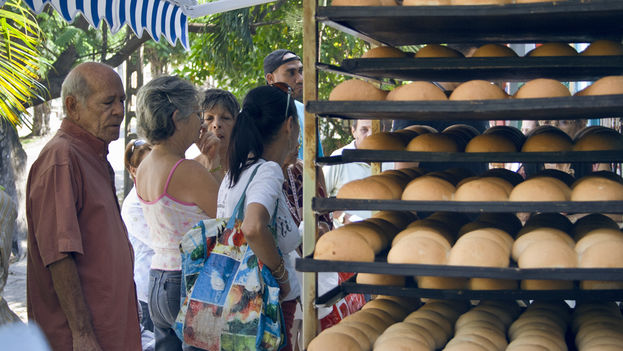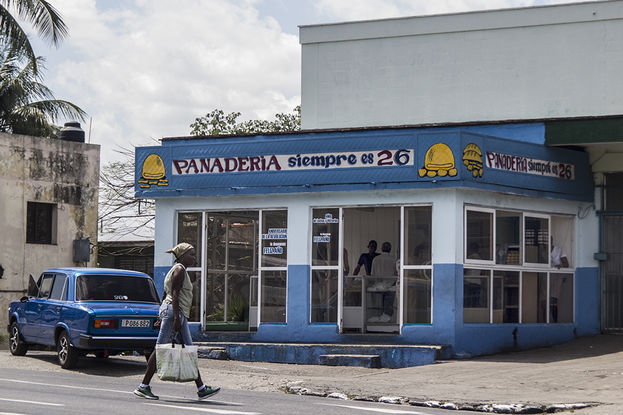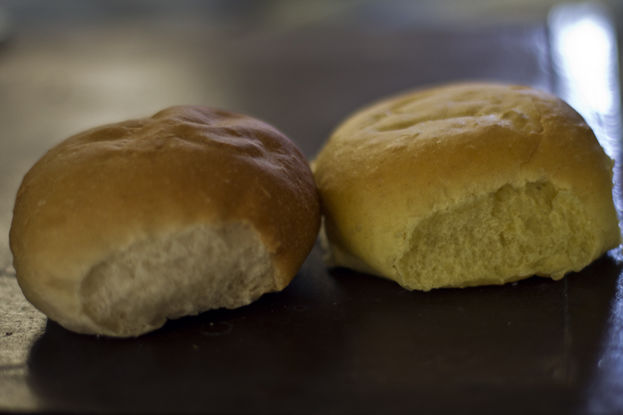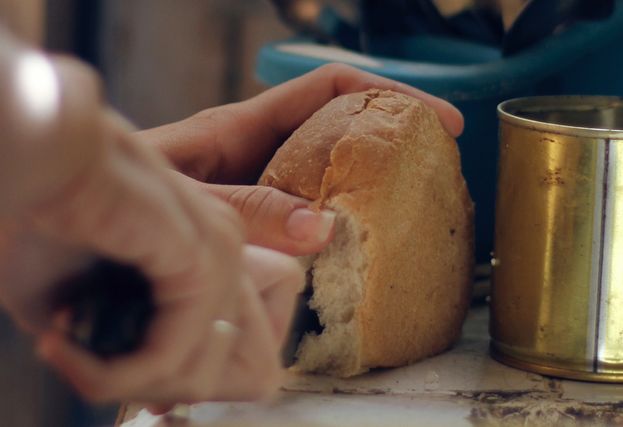
![]() 14ymedio, Zunilda Mata, Havana, 9 July 2017 — With a sharp knife and the skill of a surgeon, Luis Garmendia, 68, slices the bread from the rationed market into six small slices. Like so many Cubans, this retiree cannot afford to buy from the liberated (unsubsidized) bakeries and considers that, every day, the quality of the basic product is “worse.”
14ymedio, Zunilda Mata, Havana, 9 July 2017 — With a sharp knife and the skill of a surgeon, Luis Garmendia, 68, slices the bread from the rationed market into six small slices. Like so many Cubans, this retiree cannot afford to buy from the liberated (unsubsidized) bakeries and considers that, every day, the quality of the basic product is “worse.”
In the Havana neighborhood of Cerro, where Garmendia lives, the ration bread ‘starred’ in the last assembly of accountability with the local People’s Power delegate. “Since I started going to those meetings, the same problem arises, but it is not solved,” he protests.
The capital has 367 establishments dedicated to producing “ration bread.” Most have serious technical difficulties, according to a recent report on national television. In the last three years at least 150 of them have been renovated but customer dissatisfaction continues to grow.
The taste, size and texture of the popular food are at the center of customer criticisms. Hard, rubbery, and weighing less than the required 80 grams (2.8 ounces), are the characteristics most commonly used to describe “ration bread.” Its poor quality has become a staple in the repertoire of comedians.

The product’s bad reputation leads families that are more financially comfortable to avoid consuming it. “Now we Cubans are divided between those who can eat flavorful bread and those of us who have to make do with this, subsidized and flavorless,” says Garmendia while displaying a bread roll this Friday.
According to María Victoria Rabelo, director general of the Cuban Milling Company, “It is sad and frustrating to hear the opinions of the population,” regarding the rationed product. Her entity is in charge of producing and commercializing the wheat flour used throughout the country for the manufacture of bread, confectionery and its derivatives.
In the informal market flour is highly valued especially by private business owners who make pizzas, sweets and breads. The diversion of resources from state-owned establishments has become the main source of supply to the retail sector and affects the quality of the regulated product.
“I have to take care of each sack of flour as if it were gold,” says the manager of a bakery in Marianao’s neighborhood, who preferred anonymity. “They also steal other ingredients involved in the process, such as the improver, fats and yeast,” he details.
“I am the third administrator to have this establishment in five years, the others exploited it to steal,” says the state employee. For years the business of state bakeries “has been robust, because there is a lack of controls and demand has grown as there are more cafes and restaurants,” he says.
The profession of baker has been a gold mine. In spite of the low salaries in the sector, which doesn’t exceed 30 CUC a month, there is a high demand to work in these establishments. “I know people have become millionaires with the resale of ingredients or of the product,” says the administrator.

“There are places where employees at the counter pocketed at least 400 CUP per day just selling the bread that is destined for the basic basket under the table.” Inside, near the ovens, “workers can get away every day with up to 800 Cuban pesos [Ed. note: more than the average monthly wage],” he confirms.
Each ingredient has its own market. “The baked bread is much sought after by paladares (private restaurants), coffee shops and people who organize parties,” he adds. While “the yeast and improver end up in the business of selling pizza and the fats have a wider clientele.”
The administrator of the bakery on Calle 19 and 30 in Playa, Reina Angurica, believes that in order to avoid embezzlement, she must “talk to the workers, communicate with them and not allow illegal productions.” In their place they meet weekly “to talk about the short-term problems of the bakery and to eradicate them,” she told the national media.
The Cuban Milling Company imports 800,000 tons of wheat each year which is processed in five mills throughout the country, three of which are in Havana. “Strong wheat or corrector” is mixed with “weak” wheat to produce the flour sold to the food industry.
The ration market bread is made with a “weak or medium strength flour” ideal for achieving soft texture. However, the wheat blend has been affected by import irregularities and the state bakers are only receiving strong flour, more suitable for a sturdier bread.

With more than 7,500 workers in the capital and a daily consumption of 200 tons of flour, the Provincial Food Industry Company is directly responsible for the ration bread. But the entity is floundering everywhere because of the lack of control, hygiene problems and the poor quality of its products.
In some 1,359 inspections carried out in the last months in the facilities of this state company, there were 712 disciplinary measures imposed for irregularities in the preparation of the product. The problems detected ranged from indisciplines and diversion of resources to lack of cleanliness.
For María Victoria Rabelo, from the Cuban Milling Company, the technological difficulties or the problems with the raw material are not the keys to understanding the current situation: one must “dignify the profession and, without speaking with demagoguery, bring love to what we do,” she says with determination.
But in Cerro, where Garmendia is waiting every day for a miracle to improve the rationed bread, the words of the official sound like Utopia. “I do not want anything fancy, I just want it to be tasty and softer, nothing more,” says the retiree.
